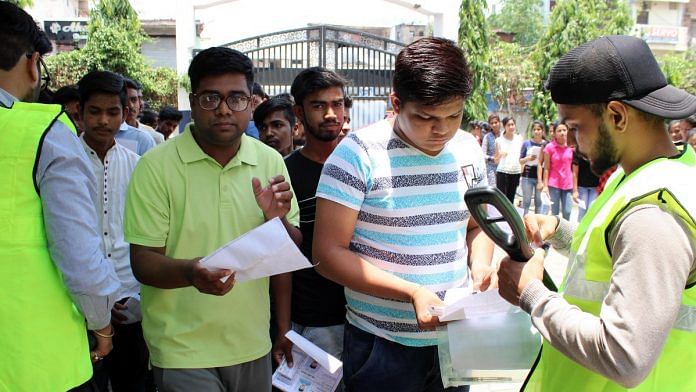New Delhi: The Supreme Court Wednesday held that the National Eligibility cum Entrance Test (NEET) for medical and dental courses does not violate the rights of aided or unaided minority institutions under the Constitution.
The Supreme Court bench, comprising Justices Arun Mishra, Vineet Saran and M.R. Shah, ruled that Articles 30 and 19(1)(g) do not stop the government from providing regulatory measures for admissions to educational institutions in “national interest”.
Minority medical colleges had challenged NEET, instituted in 2013 to replace the All India Pre-Medical Test (AIPMT), contending that the government could not compel them to conduct a compulsory entrance examination, as minorities have the right to administer their institutions under Article 30. This provision allows religious and linguistic minorities to “establish and administer” educational institutions of their choice.
This right to administer, the institutions had said, includes the right to conduct their own entrance exams for admissions.
But the court observed: “There is no right given to maladminister the education derogatory to the national interest. The quality of medical education is imperative to subserve the national interest, and the merit cannot be compromised.”
The court asserted that no exemption can be granted from NEET, and lamented that education at present was “devoid of its real character of charity, it has become a commodity”. Therefore, a uniform entrance test, it said, was “intended to check several maladies which crept into medical education, to prevent capitation fee by admitting students which are lower in merit and to prevent exploitation, profiteering, and commercialisation of education”.
Article 19(1)(g), meanwhile, provides the right to “practice any profession, or to carry on any occupation, trade or business”. But the court noted that this right is not absolute and is subject to “reasonable restrictions”, “in the interest of the general public” under Article 19(6).
Also read: NEET postponed amid Covid-19 lockdown, new exam date could be end-May or June
‘Head and shoulders’ above NEET
The ruling came on a bunch of petitions originally filed in 2012, challenging the notifications for NEET issued by the Medical Council of India (MCI) and the Dental Council of India (DCI).
These notifications were struck down in 2013 by a three-judge bench with 2:1 majority. The court had then held that MCI and DCI did not have the power to introduce NEET through these notifications, and that NEET violated the rights of minority educational institutions.
However in April 2016, a five-judge bench recalled the 2013 judgment after review petitions were filed against it, and opened the cases for fresh hearing. The court also permitted NEET to be conducted in the meantime.
In May 2016, the NEET notifications were incorporated through amendments to the Indian Medical Council of India Act, 1956, and the Dentists Act, 1948. The court was hearing a challenge to these amendments as well.
According to Wednesday’s judgment, the petitioners had contended that their admission procedure was “head and shoulders above the NEET”, and that change in the admission procedure would result in a sharp decline in the current standards of education.
In public interest
The court did not agree with the minority institutions’ contentions, and held that the notifications and amendments did not violate the rights of minority institutions.
It asserted that the decision to regulate admission in professional colleges nationally was “so as to wipe out the corruption and various evils from the system”.
NEET, the court said, was introduced in the “national interest considering the malpractices of granting illegal admission by virtually selling the seats in derogation to rights of meritorious students”.
These conditions were “reasonable and cannot be said to be taking away any of the constitutional rights of minority institutions”, the court added. It asserted that these were intended to bring transparency in professional education, and to “ensure fairness in the selection, recognition of merit, and the interests of the students”.
The court also held that the government’s direction to institute NEET was in furtherance of its duties under the Directive Principles of State Policy.
Article 47 of the Constitution makes it the state’s duty to improve public health. NEET, the court said, was “to improve medical education, correlated to the improvement of public health”.
Also read: Medical and engineering entrance exams to be held twice a year: Javadekar




Appalled to see such frivolous petitions!
NEET is mandatory no doubt for admission to medical, what about the 12th Std, why is the 12th Std needed at all?
All are not going to be Doctors and Engineers.Hence 12 th is for all others also